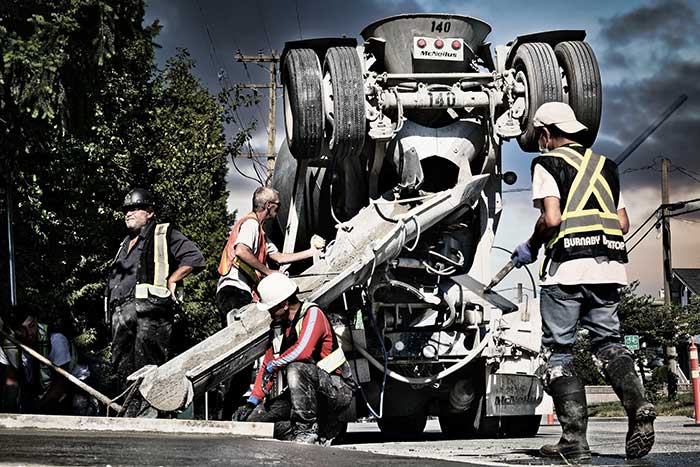Although “blacktop” and “asphalt” are frequently used interchangeably, they are not the same. Since blacktop and asphalt use the same ingredients, there is cause for confusion. Simply put, blacktop is a type of asphalt. That being said, the difference between the two stems from the same ingredients being mixed differently, as well as in their preparation process. These two different processes are dictated by the difference in usage. Asphalt is mainly used for major highways and streets, whereas blacktop, a subset of asphalt, is used more for less trafficked areas like driveways, parking lots, and playgrounds.
Similarities Between Blacktop & Asphalt
Both blacktop and asphalt use the same ingredients. Both are made from crushed stone and bitumen. Bitumen is a black viscous tar-like substance, also found in roofing materials, used to hold the crushed stones together, it is made from petroleum. Proper consistency is achieved and determined by the crushed stones used as a cutting agent. The mixture of crushed stones and bitumen is mixed in a large drum. Prior to being poured, both blacktop and asphalt are pre-mixed.
In addition to reliability and durability through many repaving jobs, another important similarity between blacktop and asphalt is that both can be driven on much sooner than concrete.
Differences between Blacktop and Asphalt
The mixtures and the process are, however, different between the two, and this difference is of critical importance. It is the ratios of crushed stone to bitumen, and the degree of heat used that determine the difference between blacktop and asphalt, and therefore the usage. Blacktop has a higher stone content than asphalt and requires being heated to a higher temperature than asphalt. Blacktop is heated to approximately 150 degrees celsius, whereas asphalt is only heated to 120 degrees celsius. Asphalt is has a higher bitumen content and for that reason is less porous and more resilient to wear and tear from high traffic and thus is the preferred choice for major highways.
Temperature:
Blacktop (150 C) > Asphalt (120 C)
Bitumen Content:
Asphalt > Blacktop
Blacktop
Blacktop is considered more of a “customer-friendly” surface. It is considered reliable and durable and is favoured for less-trafficked applications because it is easier to repair, thus its life can be extended in this way. And because these surfaces are used in situations that have less intense weight capacity, like a parking lot, they do last longer.
Asphalt
There are some good reasons that asphalt is the better choice for certain applications. It is black like blacktop, which means that it is a good surface during the winter months for freeways, highways, and roads because it retains the heat from the sun, so that snow and ice melt more quickly. Asphalt is also a harder, and more impermeable surface, having water-resistant qualities that blacktop lacks, so along with being used for road surfaces, it is also used for airport runways, cable coatings, waterproofing, reservoir and pool linings, and soundproofing.
There are different grades or types of asphalt: perpetual pavement– a more flexible surface for crack prevention, quiet asphalt– for better travel through neighbourhoods or highways close to homes, porous asphalt– for greater drainage, warm mix asphalt– for lower emissions, and hot mix asphalt– for blacktop applications
Blacktop vs Asphalt
Both blacktop and asphalt are durable. Blacktop is more malleable, and asphalt is tougher. They are both the most commonly used substances for paving. Usage determines both their composition and their development. So depending on your paving project, we will help you determine what is your best option. Whether that is asphalt, blacktop or concrete. Give us a call, or submit a contact form with your project details and our estimators will get back to you with a free estimate.
